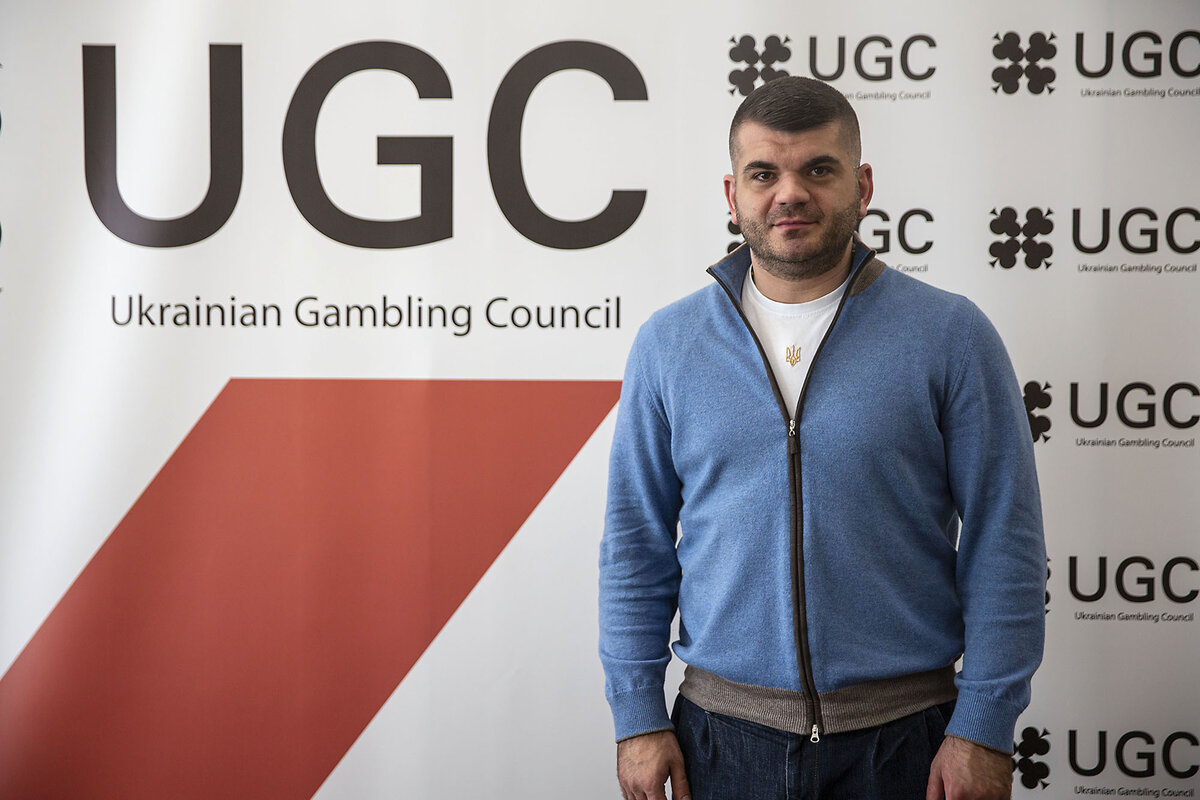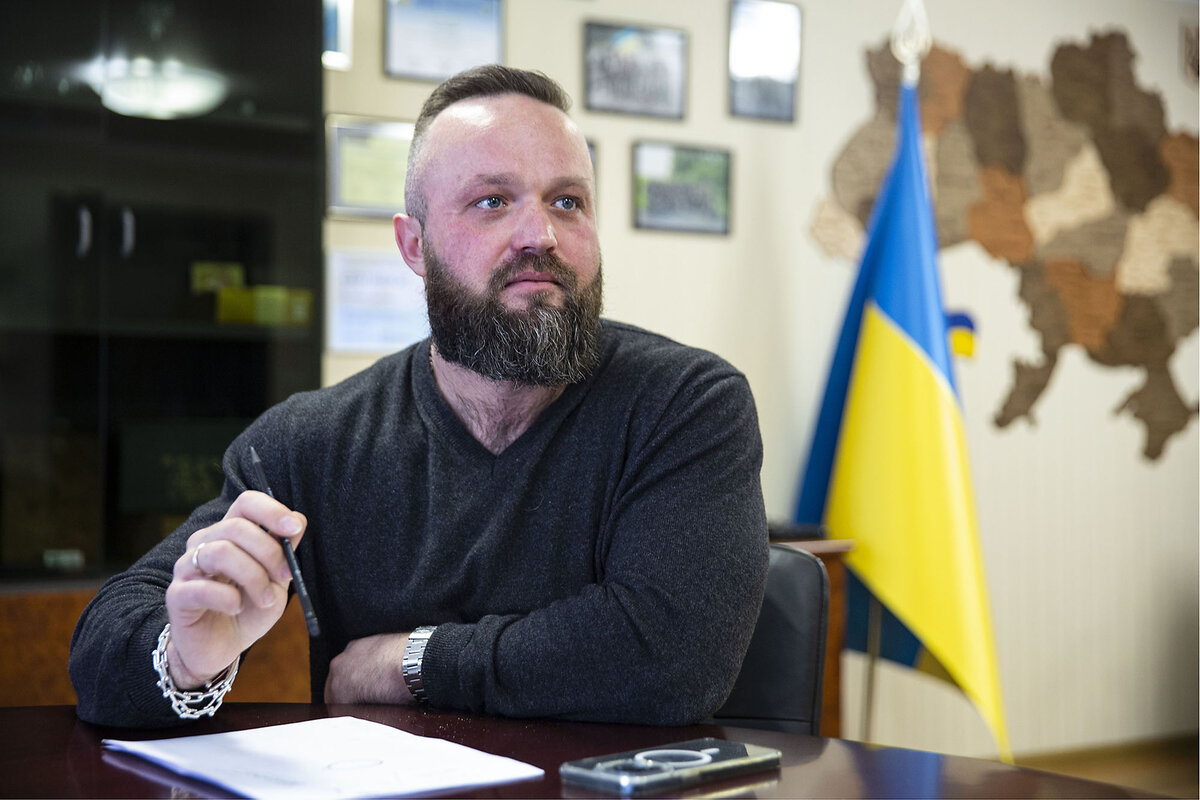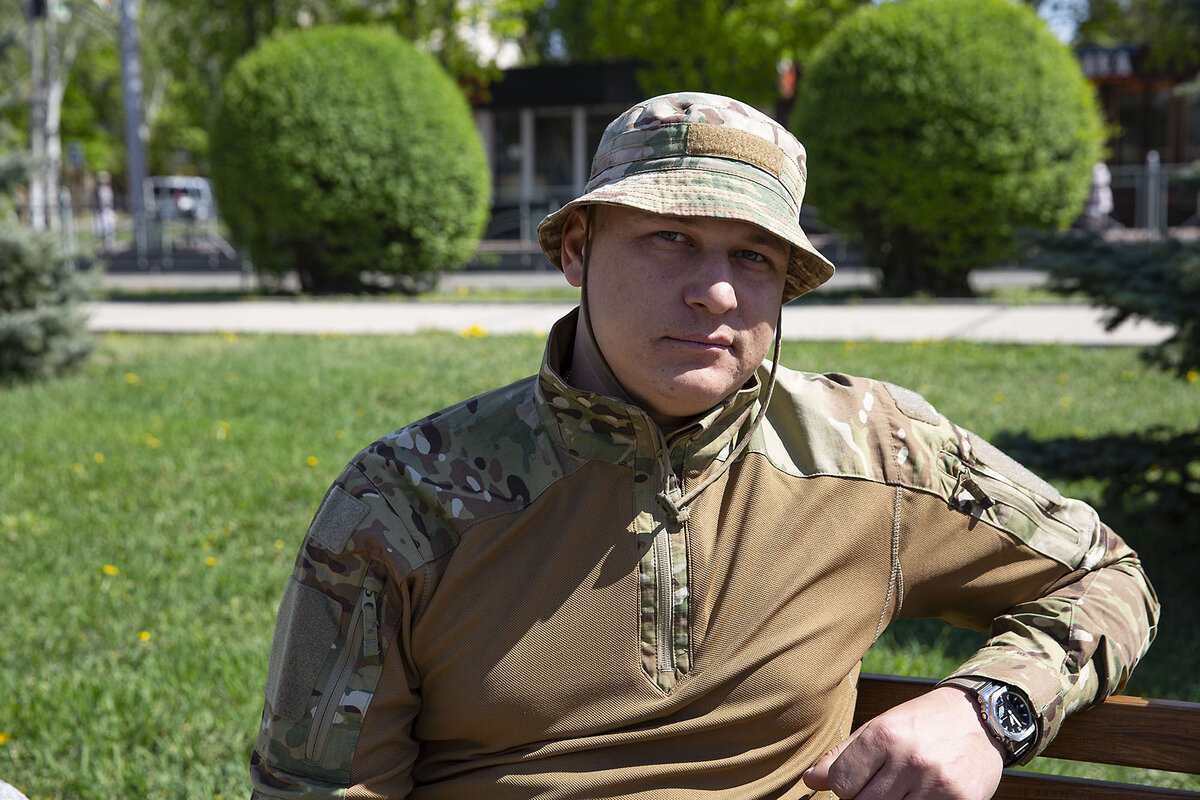Some Ukrainian soldiers are struggling with a personal foe: gambling addiction
| Kyiv, Ukraine
Russia’s war against Ukraine has brought to the surface a societal problem that predates the conflict. Soldiers already are at significant risk for gambling addiction, due to the stress of service and the sizeable amount of their salaries.
But in the course of the war, that risk has worsened for many of those in the service in Ukraine, particularly as bored soldiers find their way to online casinos during their downtime.
Why We Wrote This
A story focused onSoldiers do what they can to relieve the stress of the battlefield. For some Ukrainian troops, that has meant gambling – and gambling addiction. Now the government is trying to help them get back control.
“Online gambling among soldiers is a huge problem. It’s a way to escape reality,” says Oleksandr Antiufeiev, a psychologist. “Every soldier who has served for a long time faces problems on the family front. When they receive a salary, they spend the next few days spending that money and losing it.”
Many military servicemen reject the idea of restricting soldiers’ access to gambling, suggesting that disciplinary actions should instead be targeted towards the casino industry.
“People who spend money on online casinos earned that money,” says serviceman Vladyslav, noting that it would be complicated and unethical to control the phones of thousands of soldiers who gamble online. “I don’t think it is right to impose restrictions on military people over this.”
Oksana, a Ukrainian refugee, knows she cannot depend on her husband, Oleksandr, to provide for her and her two children. That’s because Oleksandr is in the grips of a fierce gambling addiction – a problem that has become more acute and disruptive as he serves on the front lines of eastern Ukraine.
“He was fired from one brigade because of gambling and drinking problems,” says Oksana, who is working in a pharmacy in Poland. She asked that their last names not be used for privacy. “He would leave unannounced and go to gambling rooms in Dnipro. When he couldn’t get leave, he would play online casinos on his phone.”
Russia’s war against Ukraine has brought to the surface a societal problem that predates the conflict. Soldiers already are at significant risk for gambling addiction, due to the stress of service and the sizeable amount of their salaries. But in the course of the war, that risk has worsened for many of those in the service in Ukraine, particularly as bored soldiers find their way to online casinos during their downtime.
Why We Wrote This
A story focused onSoldiers do what they can to relieve the stress of the battlefield. For some Ukrainian troops, that has meant gambling – and gambling addiction. Now the government is trying to help them get back control.
While in extreme cases it has led some soldiers to commit suicide, more frequently it results in tensions that create distrust and damage bonds, particularly among soldiers’ families.
“The army reflects society and its problems,” says Otto, a drone unit commander who sports aviators and a silver beard. “Alcohol, drugs, gambling – it all depends on the commander and whether he is willing to ignore these things. For me it is very important to have none. One person’s weakness can lead to the elimination of a whole unit.”
A new industry
Ukraine legalized gambling in 2020, after a 10-year ban. The new law allowed casinos and slot machines in hotels, as well as online gambling and bookmaking. A new body, the Commission for Regulation on Gambling and Lotteries, oversees the sector.
The commission also maintains a registry of those restricted from access to gambling establishments or participating in gambling. People can be put on the list via a court order, at their own request, or the request of a concerned member of their immediate family. All legal gambling in Ukraine, including online casinos, requires identification (including a tax ID) and a bank account, and only accepts payments in hryvnia, the national currency. Such venues also must screen visitors according to the registry, which currently has more than 7,000 people on it.
Over the past two years, there has been a proliferation of both legal and illegal online gambling websites. The risk analytics company Youcontrol has identified 2,494 companies involved with Ukraine’s gambling business (including through secondary activities), with 110 of them having questionable ties to Russia.
But “the black market is much larger,” explains Anton Kuchukhidze, chairman of the Ukrainian Gambling Council. He says there are 1,200 illegal gambling sites operating in Ukraine compared to 17 legal sites. And the black market takes payments in cryptocurrencies or dollars without the need for identification.
‘A way to escape reality’
Ukraine’s legal gambling industry has taken shape in a tumultuous time, amid Russia’s full-scale war on Ukraine. It is difficult to determine the extent of problematic gambling in the military; the commission’s registry does not distinguish between military and civilians.
There have been accounts in the local media of soldiers committing suicide due to debt, and of soldiers creating tension within units by borrowing and failing to repay. But commanders say these are isolated cases.
Nonetheless, says Oleksandr Antiufeiev, a psychologist at a Kharkiv rehabilitation center, “Online gambling among soldiers is a huge problem. It’s a way to escape reality. … Every soldier who has served for a long time faces problems on the family front. When they receive a salary, they spend the next few days spending that money and losing it.”
Mr. Antiufeiev notes that gambling addictions often coincide with drinking or drug problem and debt. “This whole business is built in such a way that it is very easy to buy drugs online, get a microloan, and then people are guided to online casinos,” he says. “The person who installs an online casino is getting targeted by the advertising of microloans and falling into the pits of debt.”
The issue was such a concern that Pavlo Petrychenko, a junior sergeant of the 59th brigade, spearheaded a petition to ban online gambling for military servicemen. “The goal of my petition is to restrict the advertising of online casinos, restrict their collaboration with charity foundations that work with military units, and prevent them from using the Armed Forces of Ukraine to wash their reputation,” he told local media.
Sergeant Petrychenko’s petition drew more than 26,000 signatures within a few hours of its launch in early April, easily earning it the number of signatures needed to be officially considered by the president. (Sergeant Petrychenko was killed in combat not long after, on April 15.)
In response to the petition, President Volodymyr Zelenskyy has ordered stricter regulation of online casinos. Implementation could include tighter advertising regulations and a ban on gambling by military personnel that are currently being studied by the military and the industry. But even such solutions bring risks, warns Ivan Rudyi, head of the Ukrainian Commission for Regulation of Gambling and Lotteries since 2020.
“There are challenges to implementing this and it poses a threat to state security,” says Mr. Rudyi, a former soldier. “If you create a military registrar, this data could become a target for our enemy.”
At the same time, lottery industry allies are pushing to abolish the commission, ostensibly because it is too slow to issue licenses. A bill tightening gambling rules and stipulating an end to the commission passed a first reading in parliament last month, with a second reading yet to come.
Mixed responses
Many military servicemen reject the idea of restricting soldiers’ access to gambling, suggesting that disciplinary actions should instead be targeted towards the casino industry.
Vladyslav, a serviceman from Khmelnytskyi who checks fortifications in east Donetsk, acknowledges that online gambling causes problems. “A lot of people in the Ukrainian army are involved in gambling and a large percentage of soldiers lose big money on online casinos that they could spend on their families or equipment for their unit,” he says.
But “people who spend money on online casinos earned that money,” Vladyslav adds, noting that it would be complicated and unethical to control the phones of thousands of soldiers who gamble online. “I don’t think it is right to impose restrictions on military people over this.”
Serhii, a native of Kryvyi Rih, ran a small plumbing business before being drafted into to the army in 2022. He was deployed in the forests of Sviatohirsk and fell into online gambling between combat missions. He never lost big money – the most was $100 during a day off – but lost regularly enough to conclude this was not the best use of either time or money.
“My wife reasoned with me because I was losing more and more money and never had anything to save,” he says. “It was not an addiction. I gambled out of boredom. We spent nine months in the forests. We came back from the mission and had nothing to do. … I stopped because I understood it doesn’t make sense. You get really invested and spend a lot of money but get nothing in return.”
Serhii believes it would be best to close online casinos altogether. “It is not right to introduce limitations” on soldiers’ free time, he says. And anyway, he adds, “everyone would be able to bypass the limits because of corruption.”
But in the view of Oleksandr, that’s the only possible solution, he says in a text message relayed through his wife, Oksana: “Shut down all the casinos and then everything will be okay.”
Reporting for this story was supported by Oleksandr Naselenko.












